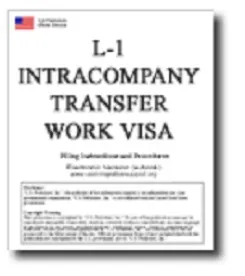Small and new foreign companies seeking to expand their business in the U.S. may benefit from the L-1 visa. An L-1 visa allows a U.S. employer/company to transfer an executive, manager, or employee with specialized knowledge from one of its affiliated foreign offices to an office in the U.S. The L-1 visa is divided into two subcategories: L-1A and L-1B. The former is issued to executives or managers of the foreign company, while the latter is for employees with specialized knowledge relating to the company’s interests. Foreign companies without a U.S. office may also obtain L-1 visas to send an employee to open a U.S. office. Thus, a foreign or U.S. entity can act as the sponsor for the L-1 visa.
Duration of L-1 Visa
The L-1 visa is a temporary professional work visa valid for up to five years for specialized knowledge employees and seven years for managers and executives. Executives, managers, or specialized knowledge employees entering the U.S. with the purpose of establishing a new office for the foreign company will be allowed a maximum initial stay of one year. All other L-1A and L-1B employees will be granted a maximum initial stay of three years. L-1A employees may extend their stay in increments of up to two years until they have reached the maximum limit of seven years. On the other hand, L-1B employees may extend their stay in increments of up to two years until the maximum limit of five years is reached.
L-1 Petitioner Requirements
To qualify as an L-1 petitioner, a U.S. or foreign company must prove that: 1) it has a qualifying relationship (i.e. parent company, branch, subsidiary, or affiliate) with a foreign company; and 2) it is currently, or will be, doing business as an employer in the U.S. and in at least one other country either directly or through a qualifying organization (i.e. parent company, branch, subsidiary, or affiliate) for the duration of the L-1 employee’s stay in the U.S. Note that the second requirement does not mean the employer has to be engaged in international trade. The petitioning company, not a third party, must primarily control and supervise its L-1 employees. To meet these requirements, the petitioning company can provide USCIS with corporate family charts, annual reports, articles of incorporation, financial statements, stockholder lists, or other documentation showing common ownership.
L-1 Beneficiary Requirements
To qualify, an L-1 foreign transferee must establish that he or she: 1) has worked for the qualifying company abroad for one continuous year within the three years immediately preceding his or her admission to the U.S. as an L-1 employee; and 2) is entering the U.S. to work in an executive, managerial, or specialized knowledge position for a U.S. branch of the same employer or one of its qualifying organizations (i.e. parent company, branch, subsidiary, or affiliate). An executive employee is one who has the ability to make decisions of wide latitude with little or no oversight. A qualifying managerial position employee should have the ability to supervise and control the work of professional employees and to manage the company or one of the company’s divisions, departments, components, etc. A managerial capacity employee can also refer to someone who has the ability to manage an essential function of the company at a high level without supervision from others. A specialized knowledge employee should have special knowledge of the petitioning company’s product, service, research, equipment, techniques, management, or other interests and its application in international markets, or an advanced level of knowledge/expertise in the company’s processes and procedures.
Family of L-1 Beneficiaries
Spouses and children (less than 21 years old) of L-1 employees can receive L-2 status. If approved, L-2 spouses and children will typically receive the same period of stay as the L-1 employee. L-2 spouses may also obtain authorization to work in the United States in any type of employment.
Additional Requirements for L-1 Visas for New Offices
For cases in which a foreign company is sending an executive, manager, or specialized knowledge employee to open an office in the U.S., the foreign company must meet additional requirements. For an L-1A visa, the petitioning employer must show that it has secured sufficient physical premises to house the new office, the employee has been employed as an executive or manager for one continuous year in the three years preceding the filing of the I-129 petition, and the intended U.S. office will support an executive or managerial position within one year of the approval of the L-1A petition. For an L-1B visa, the employer has to show that it has secured sufficient physical premises to house the new office and that it has the financial ability to pay the employee and begin doing business in the U.S.
Blanket L-1 Petitions
For companies who frequently transfer employees from their foreign offices to the U.S., USCIS offers blanket L certification. A blanket L petition allows a company to establish the required intracompany relationship in advance of filing individual L-1 petitions. To receive blanket L certification, a company must satisfy the following:
-
The petitioning company and each of the qualifying organizations (parent company, branch, subsidiary, or affiliate) are engaged in commercial trade or services;
-
The petitioning company has an office in the U.S. that has been doing business for at least one year;
-
The petitioning company has at least three domestic and foreign branches, subsidiaries, and affiliates; and
-
The petitioning company and the other qualifying organizations have obtained at least ten L-1 approvals for executives, managers, or specialized knowledge professionals during the previous year; have U.S. subsidiaries or affiliates with combined annual sales of at least $25 million; or employ at least 1,000 employees in the U.S.
An approved blanket L petition facilitates the process for an employer to transfer eligible employees to the U.S. It does away with the requirement to file an individual petition for each employee with USCIS and, thus, gives employers the ability to quickly transfer eligible employees to a U.S. office. Note, however, that an approved blanket L petition does not guarantee that an employee will be granted an L-1A or L-1B visa. In this regard, specialized knowledge employees have an additional requirement to qualify for an L-1B visa under a blanket L petition—they must also be a professional.




 />i
/>i
